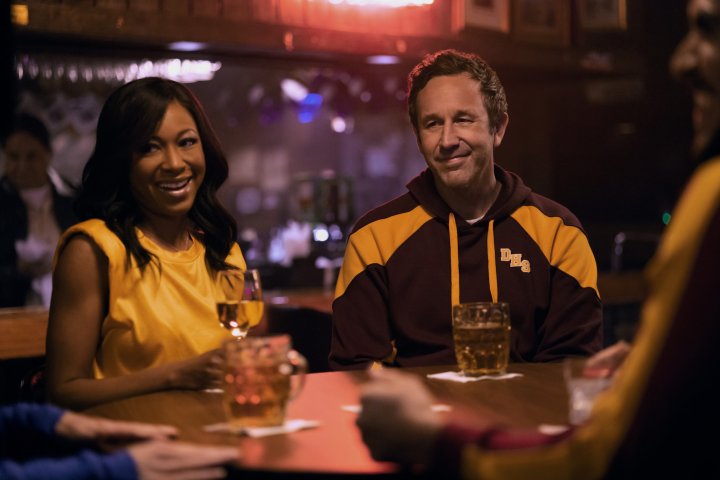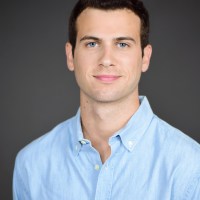Are you living life to the fullest? Have you reached your true potential? Those are the questions facing the residents of Deerfield in Apple TV+’s new comedy series, The Big Door Prize, based on M.O. Walsh’s novel of the same name. In the quiet town of Deerfield, an ’80s-inspired arcade machine called the Morpho suddenly appears at the general store overnight. For $2 in quarters, residents provide their fingerprints and social security numbers in exchange for a special blue card that reveals their life’s true potential. Some of the words and phrases on the cards include “royalty,” “magician,” and “hero.”
The central focus of The Big Door Prize revolves around Dusty Hubbard (Slumberland’s Chris O’Dowd) and his wife, Cass (Wendell & Wild’s Gabrielle Dennis). Dusty is a local school teacher and the definition of a “nice guy.” Initially skeptical of the Morpho, Dusty eventually tries the machine and receives his true potential, but the card’s confusing result makes him question his morals. Cass, on the other hand, receives a promising message from the Morpho, inspiring her to make immediate changes in her life. Developed by David West Read (Schitt’s Creek), The Big Door Prize is a heartfelt exploration of the human condition and the pursuit of happiness.
In an interview with Digital Trends, O’Dowd, Dennis, and Read spoke about The Big Door Prize’s personal themes and how the material forced them to explore questions and uncertainties in their own lives.

Note: This interview has been edited for length and clarity.
Digital Trends: When dealing with material about self-exploration, re-evaluation of one’s hopes and dreams, and the idea of a midlife crisis, it’s hard not to look at your own life. Did you experience that while working on The Big Door Prize?
David West Read: Yeah, for sure. It is kind of impossible not to think about your own life when you’re dealing with source material that’s asking such big questions. I think for anyone, even if you feel very happy or fulfilled, or you chased and achieved your dreams, there’s always this idea of the other path, the road not taken, at the back of your mind. What if I had ended up with a different person? If I had taken a different job, if I moved to a different city, where would I be now? Would it be better or worse? There’s that natural comparison to the life you think you might have had.
Gabrielle Dennis: Yeah. The interesting thing [when] I read it, we were still in a pandemic, right? For me, like you said, you automatically are going to ask these questions that the characters are asking and what the show’s theme is throughout. I was comparing the Morpho to the pandemic in a sense of when the pandemic happened, so many people stopped and reevaluated life. They stopped and asked different questions than they did pre-pandemic because now what we valued internally in our homes and where our futures were heading was in our faces now, right?
These questions became a lot more daunting and important. With the Morpho machine, it landed in this seemingly picture-perfect town where everything was good, and now there’s chaos, and we’re in the middle of that. Some people are handling it well, and some people are not. And for me, when I read the script in the pandemic, I was like, “This feels very familiar.” But I love that I got to laugh through it, [with] it being a comedy, because it can go very dark very fast with those heavy questions. I think they did such a great job, so it was exciting to jump on board.

Pandemics are not good. I want to say that on the record. However, it seems that reading the book and developing the show during a time when everyone is reevaluating their lives was the perfect storm, making this an ideal time to release a show like this. Did you feel that way?
Read: Yeah. Often, you end up creating stuff that reflects what you’re going through at the time. For me, reading this book, one of the reasons it resonated with me is because I was watching people around me talk about changing jobs, relationships, changing their identities, thinking, “OK, the world [has] stopped for once.”
There’s a moment for self-reflection to think about what we haven’t done. What’s that hobby we haven’t taken up? What’s that dream we have unexplored? People were learning the guitar, baking bread, breaking up with people, and all of that stuff happens in the show. It felt like a very fun way to talk about a very dark period [laughs]. It just became more and more timely as I worked on it.
Chris, I want to list four things, and you tell me which was the easiest to do, and which was the most difficult. Whistling, the theremin, riding a scooter, and dancing.
Chris O’Dowd: The dancing, probably. I mean, it definitely took more time. The theremin thing is fascinating because it’s impossible, I think, to play well unless you’ve got the right instrument. I watched so many YouTube videos. I tried to learn exactly where my hands were supposed to be because it operates in a very odd way where the pitch goes up.
Anyway, they all start these YouTube videos by saying, “This is almost impossible to play. I wouldn’t bother [laughs].” So all I had to do really do with the theremin was to make it look like I knew what I was doing, which I kind of did. But thankfully, it’s somebody else actually playing. But [for] the dancing, they couldn’t find a stunt double with my particular proportions.
David, why did you decide to structure each episode around a specific character?
Read: I love comedy that comes from a place of empathy where you think you know a person [that is] two-dimensional when you first meet them, and then you peel back the layers, and you get to understand why they are the way they are and what makes them tick.
The structure of the series allows us to do that where in every episode, you’re diving deep into one of the characters who might seem like a background character in the pilot and understanding them on a much deeper level. That was what seemed like the best format for exploring the idea of potential from so many different perspectives.
Did you have a favorite character to develop an episode around?
Read: I love Georgio, a character who didn’t exist in the book. When I was growing up, there was a restaurant called Frankie Tomatoes that had a Leaning Tower of Pisa on the outside, so building this restaurant with the Leaning Tower of Pasta and creating the worlds of Giorgio’s was really, really fun.
The first three episodes of The Big Door Prize are now exclusively on Apple TV+. One new episode will premiere every Wednesday through May 17.



